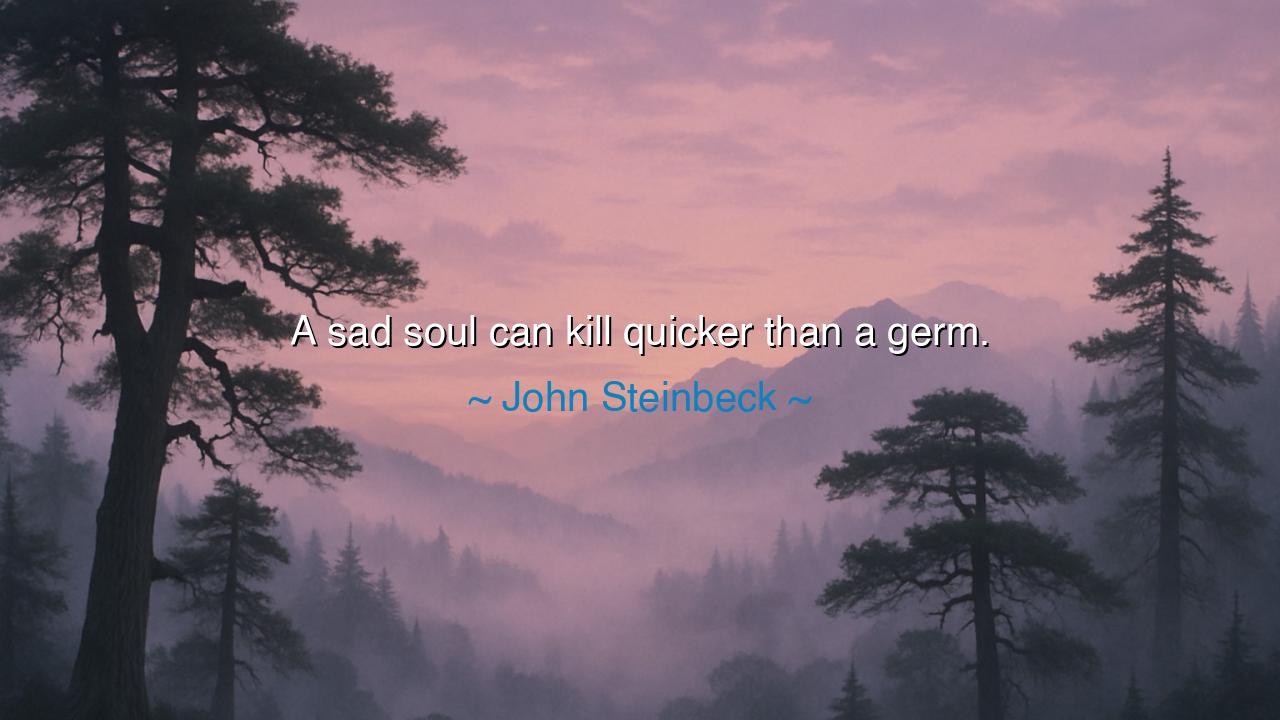
A sad soul can kill quicker than a germ.






The immortal words of John Steinbeck, “A sad soul can kill quicker than a germ,” echo through time like a solemn warning and a quiet truth. In this single line, the great writer speaks not only of the body, but of the fragile and sacred bond between the body and the spirit. He reminds us that despair — invisible, unmeasured, and silent — can destroy life faster than any sickness of the flesh. For though the body may endure hunger, toil, and pain, the soul, when burdened with sorrow, loses the will that sustains all healing.
Steinbeck, who spent his life observing the struggles of ordinary people, understood that human beings do not die only from disease — they perish also from hopelessness. In his novels, such as The Grapes of Wrath and Of Mice and Men, the poor, the broken, and the forgotten fight not only against hunger and hardship but against despair itself. He saw that the greatest danger was not in the dust, nor in the drought, but in the loss of spirit, the moment when a man ceases to believe that his life has meaning. This, he teaches, is the true sickness — the slow death that begins in the heart.
The ancients, too, spoke of this truth in other tongues. The philosophers of Greece taught that the health of the soul was the root of all strength, and the physicians of the East said that the heart governs the life-force. They knew that when joy departs, the body follows. Even the warrior-kings of old learned that the morale of an army — its shared spirit — could determine victory or defeat more than the number of its swords. Thus, across all ages, it has been known: the spirit sustains the body, and when the spirit fails, no medicine can restore life.
Consider the story of Viktor Frankl, the psychiatrist and survivor of the Holocaust. In the death camps, he saw men and women stripped of everything — health, family, dignity. Yet, he observed that those who could still find meaning, however small — a memory, a prayer, a hope — often survived longer than those who could not. The ones whose souls remained alive endured even when their bodies were weak, but those whose spirits broke, died swiftly, even when food and medicine were given. Frankl’s experience mirrors Steinbeck’s truth: despair kills faster than disease.
This truth, however, is not meant to frighten, but to awaken. For if sadness can kill, then joy can heal. If despair destroys, then hope restores. The human heart, though fragile, holds immense power. A word of kindness, a gesture of love, a purpose found — these are not small things, but lifelines. The ancients would say that a cheerful spirit is the flame that keeps the vessel warm. Without it, even the strongest body grows cold. But with it, even the frail can endure storms that would break iron.
And yet, the path to healing the sad soul is not denial. One must not flee sorrow, but face it gently, as one would a wounded friend. To bury grief is to let it fester; to express it is to let it breathe and heal. Write, speak, sing, pray — whatever keeps the soul in motion, for stagnation is the true death. Seek the company of those whose presence rekindles your flame. Even in silence, let beauty — in music, nature, or memory — remind you that life still hums with meaning. For the soul that finds wonder, even in pain, will not perish.
Steinbeck’s words, spoken through the ages, remind us that mental and spiritual wellness is not luxury, but necessity. Just as the body must be nourished with food and rest, the soul must be nourished with love, laughter, faith, and connection. A society that forgets this truth breeds illness far greater than any contagion. We must care for our hearts as we do our health — with tenderness, attention, and reverence.
So remember, children of tomorrow: guard your spirit. When sorrow visits, let it teach you, but do not let it reign. Keep the fire of joy alive, even if it burns low. Seek meaning in your days, beauty in your struggles, and compassion for yourself and others. For as Steinbeck warns, a sad soul can kill quicker than a germ — but a soul awakened by hope can give life where none was thought to remain.






AAdministratorAdministrator
Welcome, honored guests. Please leave a comment, we will respond soon